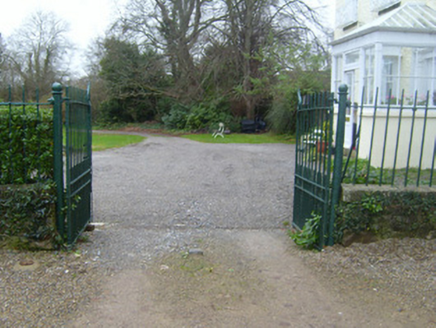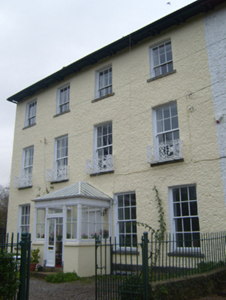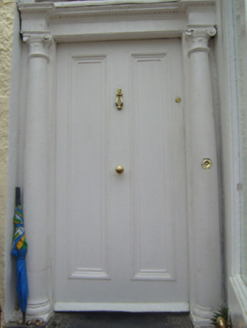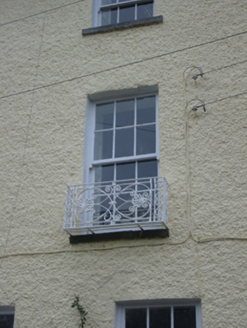Survey Data
Reg No
21807008
Rating
Regional
Categories of Special Interest
Architectural, Artistic
Previous Name
The Rectory
Original Use
House
In Use As
House
Date
1810 - 1820
Coordinates
166218, 162786
Date Recorded
11/12/2007
Date Updated
--/--/--
Description
End-of-terrace four-bay three-storey over basement house, built in 1812, having porch to front (west) elevation. Pitched slate roof with overhanging eaves, timber brackets, rendered chimneystacks and cast-iron rainwater goods. Roughcast walls having render plinth course. Square-headed openings to second floor with six-over-three pane timber sliding sash windows. Limestone sills throughout. Square-headed openings to first and ground floors having six-over-six pane timber sliding sash windows. Square-headed openings to basement with fixed windows. Wrought-iron balconies to first floor. Porch comprising rendered walls and fixed windows. Square-headed opening having glazed overlight over double-leaf half-glazed timber panelled doors. Round-headed opening having cobweb fanlight over timber panelled door with flanking render Ionic style engaged columns. Concrete steps to entrance. Cast-iron piers to south with double-leaf cast-iron gates and railings set in rubble limestone walls.
Appraisal
This house may originally have been two houses that were joined. According to Samuel Lewis's 'Topographical Dictionary', the Tontine terrace was built in 1812 by the late W. Gabbett, Esq., from a fund raised by subscription. An elegantly proportioned and substantial Georgian style house, which retains its original form and character, together with important salient features and materials. Set back slightly from the line of the road, this house which is part of a terrace, forms an attractive, sophisticated feature within the Castleconnell streetscape. The early surviving wrought-iron balcony and limestone dressings contribute to the historic character of the piece. Tontines were an investment plan in which participants buy shares in a common fund and receive an annuity that increases every time a participant dies, with the entire fund going to the final survivor or to those who survive after a specified time.







